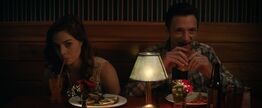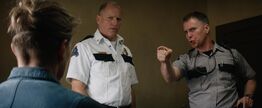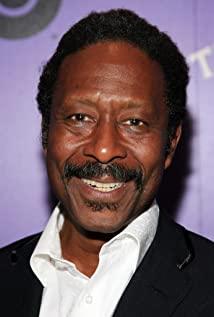If artificial intelligence understands humans by learning movies, I hope that there will be "Three Billboards" on that movie list. Because it happens to be aimed at the most complicated dimension of human nature, it provides observation horizons at different distances, and embraces this ambiguity. The director uses good props (blood violence, black humor, tragic comedy switching swing) to tell a story that is sufficiently concrete and abstract enough: how individual encounters and choices in the group collide and catalyze successively, and use serial conflicts to aggravate the loss of control of the group , And how the flexibility of human nature once again establishes a new order. In other words, "tottering" is the true state of human existence. -The film adopts a technique that I temporarily call " symmetrical narrative "-that is, placing different characters in the story in similar situations, making them face their own sinking lives at the same time, and making them make themselves Their weapons expand their battlefields, allowing them to refer to each other without knowing it, to inspire and torture each other. In this process, the characters do not embrace a certain pre-established grandeur, but are driven by the plot to evolve; the viewers are crowded in the ring to watch the battle, as if being splashed by every drop of blood in the confrontation, and here Personal choices have broken away from the classification of right and wrong of good and evil, and have returned to "cause and effect" that can be understood by any viewer. In the film, the two symmetrical existences are the heroine Mildred and the police officer Dixon. -The film opens on a wilderness road. Three billboards stand on the ground with nowhere to hide. The heroine Mildred drove by. This is the last moment she wore her long hair in the film. In the next scene, she has cut her hair short and tied it up, and more often wears a headscarf, and almost never takes off her work clothes. This outfit is an announcement that she is armed, ready to go anytime, anywhere. She went to talk about billboard leasing, and we learned that she was a mother who had lost her child. During the conversation, she helped a beetle turn over, which was the compassionate nature that she hadn't had time to put away at the beginning of the story. As the outside counterattack against the establishment of billboards has become increasingly intense, her self-defense mechanism has also been upgraded layer by layer. Grief turned into a very aggressive weapon in her hands. She transitioned from a victim to a perpetrator, and didn't care about the sympathy of outsiders, because deep in her consciousness, she knew that her daughter's death was her responsibility, and she knew that the last conversation between them would be an eternal curse. She consciously transfers self-condemnation through the sheriff, and subconsciously completes her punishment by creating a total opposition to the society. She contradicted that she knew the blindness well and did not intend to escape from it, because being in the center of the whirlpool was the purgatory she designed for herself. -On the other side of the mirror is Constable Dixon. Young deceased father, racist, suspected of homosexuality, irritable, stammers whenever he lied, and alternated between the identities of the gangster and the policeman, a southern "evil son". In the middle of the film, just as Mildred lost his daughter, he lost his father-like sheriff—the only Willoughby who acknowledged his potential glory. He immediately followed Mildred subconsciously and joined the army of "turning grief into violence"; he imitated her and chose a scapegoat for his grief: Red, the renter of billboards. A long shot follows the whole process of his violence, at which time the absurdity of violence has ooze out of the screen. People who have been plundered for no reason do not have better weapons. They can only pick up violence at hand when they are on the verge of mental breakdown, and personally implement the "dislocation of justice" rationalized by themselves, spread cruelty, and destroy others at the same time. -The next two fires turned the story around. The billboard was burned in the first scene. Mildred picked up the fire extinguisher in the car and ran towards the flame far beyond the biological scale. Her son shouted: Call the firefighter! She replied: Maybe it was their fire! At this moment, Mildred has withdrawn herself from the protection of various public safety. The scene where she ran between three huge burning billboards holding a fire extinguisher-the unquenchable fire, the irretrievable life, the chase The unrecognizable justice, the unsuccessful focus-the majestic and delicate tension caused by the tragic and majestic epic and the faintness of the ants at the same time, the shock also scratches the viewer's heart. The second game started from the first game. Mildred came to the police station late at night to retaliate, not intending to put Dixon in the fire. When the flames burned outside the window and opera music was playing in the headphones, this was another epic moment belonging to Dixon. Dixon caught the straw again from the sheriff's letter. When he carried Mildred's daughter's dossier into his arms and rolled out of the fire with flames, he achieved his purgatory purification. Mildred was also redeemed by Dixon's heroism. The two who had lost their loved ones completed the reconciliation, the broken network concluded a new connection from the breakpoint, and this change was the common fulcrum that they each found in order to survive and transcend instinct . -The film then slyly arranged an occasion for each of them where violence is most likely to brew: Dixon, who was burned, and advertiser Red, who was injured by Dixon, were placed in a ward; Mildred and the culprit of the burning billboard-Mildred's Ex-husband-Arranged in a restaurant. But at this time the instinctive beast had been tamed. At the moment when the conflict was about to break out, Dixon chose to apologize, and Mildred chose to let it go. The fun of this "symmetrical narrative" is the ingenuity of the filmmakers to thread the complicated evolution of the characters in the story and rationalize those unexpected transitions. -The uniformity of the characterization of the film is also worth mentioning. For example, Mildred's daughter inherited her father's appearance and bursting temperament, while her son is more like Mildred, inheriting her brown eyes, tolerance, and decisiveness when resisting. For example, Sheriff Willoughby committed suicide because he did not want his wife and children to see his masculine dignity conquered by illness, but also out of dignity, he could not admit this cowardice to the public, so he took advantage of the billboard to act as a martyr. . For example, the people in the film are violent with their bare hands, and the only time the gun is used is for self-solve. De-mechanization, de-instrumentation, and even de-conspiracy, always return to the true nature of human beings. Correctness is absurd, justice is dangerous, and violence is a concession to the defects of human instinct. However, violent confrontation does not necessarily lead to a two-way degeneration. Human plasticity and vague divinity are always worthy of optimism. How to reach it? Try to understand and restore each other's defenses. Or continue on the road. Living is the answer.
View more about Three Billboards Outside Ebbing, Missouri reviews











